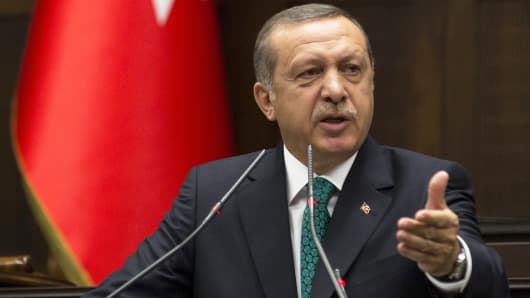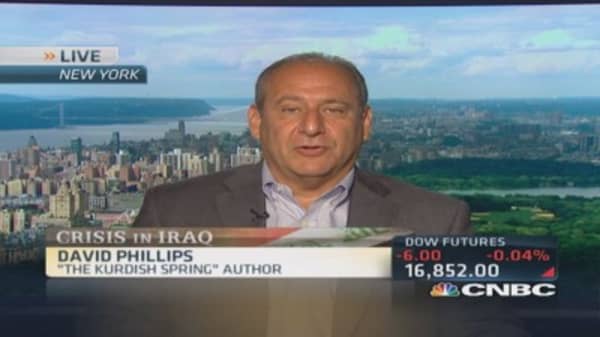Turkey's Prime Minister Recep Tayyip Erdogan is also an Islamist. He is, however, different from ISIS. Erdogan may be authoritarian, but he does not commit mass murder or chop off the heads of adversaries.
Read MoreIraq is on the verge of collapse: David L. Phillips
Erdogan studied Islamism at the Imam Hatip School in Istanbul. He got started in politics by organizing an Islamic youth group. When Erdogan successfully ran for mayor of Istanbul in 1994, he declared himself a "servant of sharia," a strict moral code. He banned alcohol and insisted that his wife publicly wear a "hijab," a scarf covering the head and neck. In 1999, Erdogan was convicted of "inciting hatred based on religious differences" for publicly declaring "Minarets are our bayonets; domes are our helmets; mosques are our barracks. My reference is Islam."
When Erdogan became prime minister, he adopted a "zero problems with neighbors" policy and courted Bashar al-Assad. He was incensed when Al-Assad ignored his entreaties, intensifying attacks against Arab Sunnis.
Turkey was gradually drawn into Syria's civil war: Syria shot down a Turkish RF-4E Phantom reconnaissance plane near the coastal city of Latakia in June 2012. Syria shelled the Turkish border town of Akcakale, killing five people in October 2012. Reyhanli, a town in Turkey's Hatay Province with a similar ethnic and sectarian mix to Syria's, was rocked by car bombings in May 2013, killing 53 people and wounding 140. Syria repeatedly violated Turkey's air space, causing Turkey to shoot down a Syrian helicopter in September 2013, and a Syrian MIG 23 in March 2014.
Moreover, Turkey became a party to Syria's conflict through its support for Sunni opposition and jihadi groups – like ISIS.
Read MoreIraq war: Here are the worst and best scenarios
Turkey's intelligence agency provided Muslim militias with arms, ammunition, money, and logistical assistance. Financed by Saudi Arabia and other emirates, Turkey operated a cross-border supply channel for Salafi groups fighting in Syria such as Jabhat al-Nusra Front, Ahrar al-Sham, and ISIS. Today, there are up to 3,000 jihadis from Turkey and European countries in Syria and Iraq, learning skills they may use for terror attacks at home.
Iraqi Kurdistan is an island of stability compared to the chaos in Iraq and Syria. Since 2012, Turkey and Iraqi Kurdistan have forged a strategic and business partnership. About $12 billion in Turkish goods were sold in Iraqi Kurdistan last year. Turkish construction companies signed lucrative contracts to build skyscrapers, airports, and highways. Oil and gas from Iraqi Kurdistan is transported to the Turkish port of Ceyhan on the Eastern Mediterranean. A new pipeline was opened on May 2, transporting about 200,000 barrels a day. The pipeline will transport 1 million barrels a day by 2015. Today, the KRG was paid $93 million for delivering its first oil exports to Turkey. There is more in the pipeline. Iraqi Kurdistan has 45 billion barrels of oil reserves.





